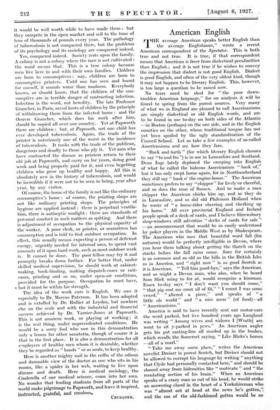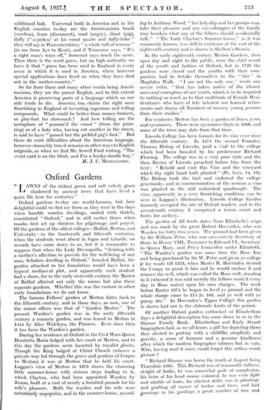American English
THE average American speaks better English than the average Englishman," wrote a recent American correspondent of the Spectator. This is both true and not true. It is true, if that correspondent means that American is freer from dialectical peculiarities than English ; and it is not true if he wishes to convey the impression that dialect is not good English. Dialect is good English, and often of the very oldest kind, though it may not happen to be literary English. This, however, is too large a question to be raised now.
No tears need be shed for " the poor down- trodden American language," for on analysis it will be found to spring from the purest sources.. Very many of what we in England are pleased to call Americanisms are simply dialectical or old English words, and are to be found in use to-day on both sides of the Atlantic —in Boston (perhaps) on the one side, and in the English counties on the other, whose traditional tongue has not yet been spoiled by the ugly standardization of the Council School. Let us take a few examples of so-called Americanisms and see how they fare.
"Back and forth " (for which literary English chooses to say "to and fro ") is in use in Lancashire and Scotland.
Dean Inge lately deplored the creeping into English of what he called the hideous Americanism " back of," but it has only crept home again, for in Northumberland they still say " back o' the engine-Noose.'.' The American sometimes prefers to say "chipper " for lively or cheerful, and so does the man of Sussex. And to make a man chipper the American chirks him up, and so they do in Lancashire, and so did old Philemon Holland when he wrote of " a horse-rider cheering and cherking up his horse." All over provincial England and Ireland people speak of a deck of cards, and I believe Shrewsbury shop-windows still advertise " decks of cards for sale " —an announcement that would be as easily understood by poker players in the Middle West as by Shakespeare. The American who uses that beautiful word fall (for autumn) would be perfectly intelligible in Devon, where you hear them talking about getting the thatch on the stacks before the fall rains come. Sure for certainly is as common and as old as the hills in the British Isles as in America, and " right now " is as good Scotch as it is American. " Tell him good-bye," says the American; and so might a Devon man, who also, when he heard Sam Slick using to for at, would recognize a kinsman. Essex to-day says " I don't want you should come," " that pig cost me most all of £8," " I count I was some vexed," " altered a piece," and speaks of " a little ole world " and " a nice mess " (of food)—all " Americanisms."
America is said to have recently sent our motor-cars the word parked, but five hundred years ago Langland was writing " Among wives and widows I [Wrath] am wont to sit y-parked in pews." An American angler gets his gut casting-line all snarled up in the bushes, which recalls the Somerset saying, " Like Hicks's horses —all of a snarl."
" Take me away some place," writes the American novelist Dreiser in purest Scotch, but Dreiser should not be allowed to corrupt his language by writing " anything that Clyde had personally contacted here," and should be shooed away from hideosities like " motivate " and " the mentating section of his brain." When an American speaks of a crazy man as out of his head, he would strike an answering chord in the heart of a Yorkshireman who was " almost .00t at head at the news he's gotten,". and the use of the old-fashioned gotten would be an additional link. Universal both in America and in the English counties to-day are the Americanisms brash (careless), feaze (disconcert), mad (angry), shoat (pig), daffy (" a-picken' at his cooat quaire and daffy-loike " they will say in Worcestershire), " a whole raft of reasons " (in use from Ayr to .Kent), and if Tennessee says, " It's a right man's ways off," Somerset says much the same. Then there is the word guess, but on high authority we have it that " guess has been used in England in every sense in which it is used in America, where however special applications have lived on when they have died out in the mother-country."
So far from these and many other words being Ameri- canisms, they are the purest English, and to this extent America is preserving parts of a language which on our side tends to die. America, too, claims the right once flourishing in England of inventing ingenious and telling compounds. What could be better than money-burners, or glue-foot for slowcoach ? And how telling are the metaphors of " possum'd the count " (from the prize- ring) or of a lady who, having cut another in the street, is said to have." passed her the pickled pig's foot." But there do exist difficulties about the American language, however staunchly true it remains in other ways to English originals, as when we find Mr. Sewell Ford writing, "The event-card is on the blink, and I'm a bunky-doodle boy."
M. J. C. MEIKLEJOIIN.







































 Previous page
Previous page